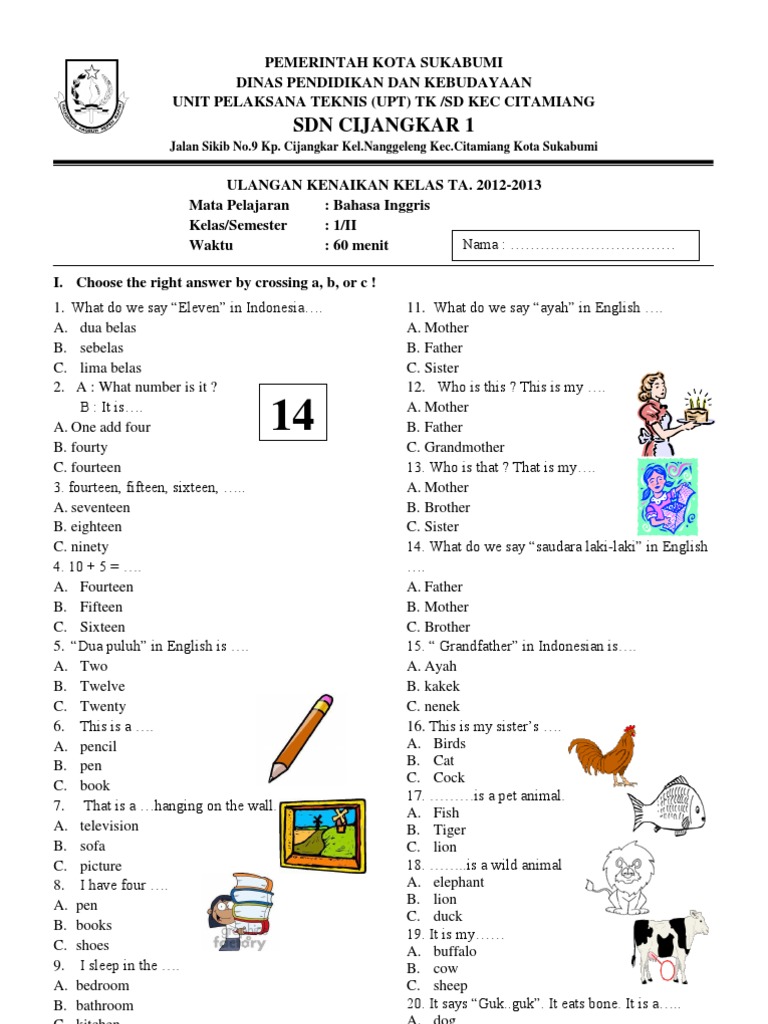II. Grammar Focus:
A. Nouns (Singular and Plural, Common and Proper)
B. Pronouns (Subject and Object Pronouns)
C. Verbs (Present Tense, Simple Present Tense)
D. Adjectives (Descriptive Adjectives)
E. Adverbs (Frequency Adverbs)
F. Prepositions (Simple Prepositions of Place and Time)
G. Conjunctions (Coordinating Conjunctions)
H. Sentences (Simple, Compound Sentences)
III. Vocabulary Building:
A. Commonly Used Words
B. Expanding Vocabulary Through Context
IV. Reading Comprehension:
A. Identifying Main Ideas
B. Understanding Supporting Details
C. Inferencing Meaning
V. Writing Skills:
A. Simple Sentence Construction
B. Paragraph Writing
C. Narrative Writing
VI. Sample Questions and Exercises
VII. Conclusion: Preparing for Future English Studies
English Language for Grade 6 Semester 1
I. Introduction: The Importance of English Language Proficiency in Grade 6
The foundation for strong English language skills is laid during the elementary years, and Grade 6 is a crucial stage in this development. Proficiency in English opens doors to a wider range of opportunities, enhancing communication skills, improving comprehension, and fostering critical thinking abilities. A strong grasp of grammar, vocabulary, and comprehension skills at this level provides a solid platform for success in higher-level English studies. This article provides a comprehensive overview of the key areas covered in a typical Grade 6 English curriculum during the first semester, focusing on grammar, vocabulary, reading, and writing.
II. Grammar Focus:
A. Nouns: Grade 6 students should understand the difference between singular and plural nouns (e.g., cat/cats, book/books) and common and proper nouns (e.g., cat/Felix, city/London). Exercises should involve identifying and classifying nouns in sentences and paragraphs. They should also learn about collective nouns (group, team, flock).
B. Pronouns: Understanding subject pronouns (I, you, he, she, it, we, they) and object pronouns (me, you, him, her, it, us, them) is essential. Students should be able to correctly use pronouns to replace nouns in sentences, avoiding pronoun ambiguity.
C. Verbs: Focusing on the present tense, specifically the simple present tense, is crucial. Students need to understand the conjugation of verbs (e.g., I walk, you walk, he/she/it walks, we walk, they walk) and their use in constructing simple sentences. They should also be introduced to the concept of helping verbs (is, am, are).
D. Adjectives: Descriptive adjectives add richness and detail to writing. Students should learn to identify and use adjectives to describe nouns (e.g., the big red ball, the fluffy white cat). Comparative and superlative adjectives (big, bigger, biggest) should also be introduced.
E. Adverbs: Adverbs modify verbs, adjectives, or other adverbs, indicating how, when, where, or to what extent an action is performed. Focus should be on frequency adverbs (always, usually, often, sometimes, rarely, never).
F. Prepositions: Understanding prepositions of place (on, in, under, above, beside, behind) and time (at, on, in) is essential for constructing clear and accurate sentences. Exercises should involve using prepositions correctly in context.
G. Conjunctions: Coordinating conjunctions (and, but, or, so, yet, for) connect words, phrases, and clauses. Students should learn to use conjunctions to combine simple sentences to create more complex sentences.
H. Sentences: Students should master the construction of simple sentences (subject-verb-object) and be introduced to compound sentences, joining two simple sentences with a conjunction. They should understand the importance of subject-verb agreement.
III. Vocabulary Building:
A. Commonly Used Words: Expanding a student’s vocabulary is crucial. This involves learning commonly used words in various contexts, focusing on their meanings and usage. Using flashcards, word games, and context clues can be effective methods.
B. Expanding Vocabulary Through Context: Students should learn to deduce the meaning of unfamiliar words based on their context within a sentence or paragraph. This improves reading comprehension and vocabulary acquisition.
IV. Reading Comprehension:
A. Identifying Main Ideas: Students should be able to identify the main idea of a paragraph or passage, distinguishing it from supporting details.
B. Understanding Supporting Details: Recognizing and understanding supporting details that provide evidence for the main idea is crucial for comprehensive reading comprehension.
C. Inferencing Meaning: Developing the ability to infer meaning from the text, going beyond explicitly stated information, is a key skill. This requires students to draw conclusions and make predictions based on textual evidence.
V. Writing Skills:
A. Simple Sentence Construction: Students should be able to write grammatically correct simple sentences with clear subjects and verbs.
B. Paragraph Writing: Constructing well-organized paragraphs with a topic sentence, supporting sentences, and a concluding sentence is a vital writing skill.
C. Narrative Writing: Writing short narratives, including stories and personal anecdotes, allows students to develop their storytelling abilities and improve their sentence structure and vocabulary usage.
VI. Sample Questions and Exercises:
Here are some examples of questions and exercises that assess the concepts covered above:
- Identify the nouns in the sentence: The playful dog chased the red ball in the park.
- Rewrite the sentence using a pronoun: The cat sat on the mat. The cat was fluffy.
- Write a sentence using the simple present tense of the verb “play”:
- Describe the flower using at least three adjectives:
- Add an adverb to the sentence: The bird sang.
- Write a sentence using the preposition “on”:
- Combine the two sentences using a conjunction: The sun was shining. The birds were singing.
- What is the main idea of the following paragraph? (A short paragraph would be provided.)
- Write a short paragraph about your favorite pet.
- Write a short story about a day at the beach.
VII. Conclusion: Preparing for Future English Studies
Mastering the concepts outlined in this article provides a strong foundation for success in future English language studies. Consistent practice and engaging learning activities are key to building confidence and fluency. By focusing on grammar, vocabulary, reading comprehension, and writing skills, Grade 6 students can develop a solid understanding of the English language, paving the way for continued academic achievement and personal growth. Regular assessment and feedback are also essential to track progress and identify areas needing further attention.

